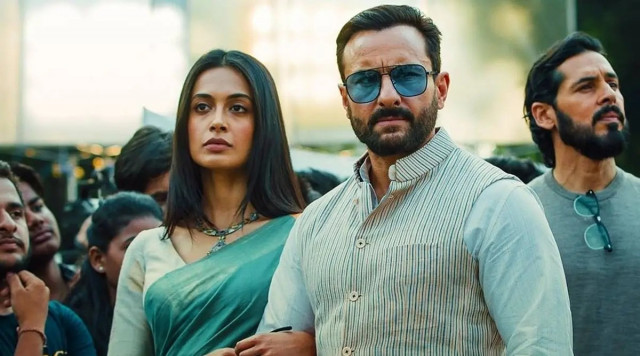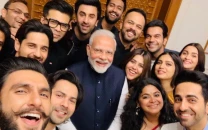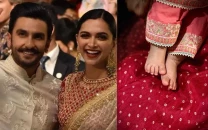Is Netflix being targeted by jingoism in India? Decoding right-wing parties' influence
Censorship is not new in India, but the recent backlash against streaming platforms presents unparalleled challenges

With high hopes of a grand release in 2022, Netflix and director Dibakar Banerjee aimed for the spotlight with their latest film titled Tees. Yet, weeks passed, and the streaming giant remained ominously silent. Tees explores the social and political struggles of minority communities in India, weaving a multigenerational tale of a Muslim family navigating life from 1989 to 2024.
The film boasts an impressive cast, including Naseeruddin Shah, Kalki Koechlin, Huma Qureshi, Shashank Arora, and Neeraj Kabi. Despite this powerhouse lineup, Netflix's response was the equivalent of ghosting after a first date.
After submitting the film, the production company, Energy, nudged Netflix for an update, only to be told there were no plans for a release. Banerjee told Deadline the streaming platform offered no explanation for shelving the project, leaving the director and his team in a frustrating limbo. Shot in 2020 and handed over in May 2022, Tees lingered in a state of uncertainty for months.
The International Film Festival of Rotterdam extended an olive branch, inviting Tees to premiere in the Limelight section. However, Banerjee hit a significant roadblock: Netflix wouldn't green-light the screening. While the director could send links to potential buyers, festival exposure was off the table. This left Banerjee in what he described as a "chicken-and-egg situation," stuck between needing festival buzz to attract buyers and needing buyers to justify a festival screening.
Banerjee pointed to India's shifting political climate as a likely culprit for Netflix's reluctance. He told Deadline, “Netflix has never given me any other reason except they don’t know if this is the right time to release the film. Given what happened with Tandav, the only conclusion to reach is that Netflix is reluctant to release the film out of fear of being similarly targeted. But the film I have made is very different to the web series in question.”
Tees is not alone in its purgatory. It joins a growing list of films and series stalled or turned around by streaming platforms, thanks to India's increasingly intolerant political atmosphere. In 2021, criminal charges were filed against Prime Video executives and the cast and crew of the Hindi-language series Tandav, following complaints from India’s Bharatiya Janata Party (BJP) politicians and their supporters. This incident set a precedent, and streaming platforms are now more cautious than ever.
In the wake of the Tandav controversy, several high-profile projects have hit the brakes. Anurag Kashyap’s adaptation of Maximum City and Prime Video’s second season of Paatal Lok are notable casualties. Tandav eventually streamed, but only after Prime Video made the necessary cuts and executives agreed to cooperate with an investigation.
Despite dissenting voices within Bollywood advocating for creators to tackle sensitive subjects, critics highlight that not only the BJP, but other governments are often averse to such content. Filmmakers reveal that right-wing Hindu groups and political parties often pressure them to produce films or series aligned with 'their narrative,' effectively turning creative expression into a political tool.
Censorship is not new in India, but the recent backlash against streaming platforms presents unparalleled challenges. Filmmakers now face a trilemma: abandon their thoughts, self-censor, or craft content that panders to the right-wing agenda.
Netflix has sidestepped direct discussions about Tees, but a spokesperson told the BBC, "Our range extends across Indian films and TV shows, reflecting our long-standing support for creative expression. This diversity not only mirrors the varied tastes of our viewers but also sets us apart from our counterparts."
This recent shift starkly contrasts with the optimism sparked by the arrival of global streaming giants like Netflix and Amazon Prime in the mid-2010s. Their emergence was expected to revolutionise Indian filmmaking, offering new opportunities to directors, actors, and scriptwriters. The advent of streaming platforms was seen as a beacon of hope, promising a shift from star-studded casts to compelling narratives and themes. This optimism encouraged many in the industry to explore new territories, as streaming releases were free from the censor board's stringent demands. (It’s worth noting that the Indian government recently proposed a bill to regulate streaming platforms.)
However, the hope to blur the lines of religion and politics struck a discordant note for some. Projects that initially irked these factions included films depicting the 'lynching' of Muslims or love stories between characters from different religions that highlighted casteism and religious biases.
The Ministry of Information and Broadcasting in India declined to respond to the BBC's queries. A BJP spokesperson refused to comment on the matter, while another remained silent.
Creators lament that the spectre of unseen fears has forced them to adopt self-imposed censorship, exercising extraordinary caution in their work. Many industry insiders suggest that amid escalating legal disputes, production houses and streaming platforms have bolstered their legal teams, scrutinised not only words, dialogues, and scenes but also overseeing the selection of actors, often leaning towards "creators' choices."
For a series addressing societal and political issues, one streaming platform issued guidelines obtained by the BBC. These guidelines stated, "No reference should be made to any caste (or sub-caste, clan, or tribe) or any leader or member of such groups under the prevalent caste system in India." Further, "Such stories should be presented as individual personal experiences, not as representative of all individuals belonging to that religion or caste."
In a climate where creative expression is increasingly stifled, Banerjee’s struggle with Tees epitomises the broader challenges faced by filmmakers. As the political landscape continues to shift, the battle for artistic freedom rages on, with creators caught in the crossfire of a complex and evolving censorship regime.
Have something to add to the story? Share it in the comments below.




1728027244-0/Copy-of-Untitled-(91)1728027244-0-208x130.webp)

1726487011-0/Untitled-design-(52)1726487011-0-208x130.webp)












COMMENTS
Comments are moderated and generally will be posted if they are on-topic and not abusive.
For more information, please see our Comments FAQ